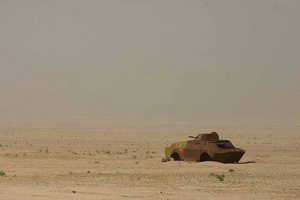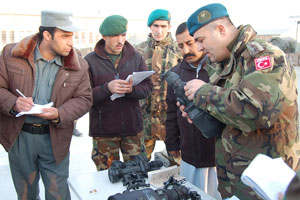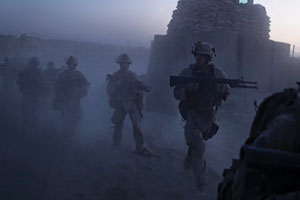The headline above could have been used for any sum-up of the Afghanistan war over the past years. This has become the United States’ longest war, and there have yet to be any decisive turns. On Saturday, The Washington Post ran a story headlined, “U.S. military, civilian officials claim progress in Afghan war.” The opening:
KABUL – With a year-end report card coming due, top U.S. military and civilian officials in Afghanistan have begun to assert that they see concrete progress in the war against the Taliban, a sharp departure from earlier assessments that the insurgency had the momentum.
Despite growing numbers of Taliban attacks and American casualties, U.S. officials are building their case for why they are on the right track, ahead of the December war review ordered by President Obama. They describe an aggressive campaign that has killed or captured hundreds of Taliban leaders and more than 3,000 fighters around the country in recent months, and has pressured insurgents into exploring talks with the Afghan government. At the same time, they say, the Afghan army is bigger and better trained than it has ever been.
Sounds like a major progress, right? But halfway through the article, there’s this:
Yet even as U.S. officials here echo [Defense Secretary Bob] Gates’s [optimistic] assessment, they have offered relatively little evidence to back up their claims of progress, and many still hesitate to say that successes against the Taliban in certain pockets add up to the war’s pendulum swinging their way. Indeed, one week last month broke the nine-year war’s record for violence, as the Taliban sought to ambush parliamentary elections: NATO forces logged more than 1,600 attacks nationwide, 500 more than in the previous worst week.
In other words, never mind. So we have talk of progress, but no concrete signs of progress. Perhaps this should have been the central point of the article, not the unproved claims of advances.
Meanwhile, there’s hard evidence of what’s not going well. The recent parliamentary elections were chock-full of fraud, and Afghan and Western officials estimate that nearly one-quarter of the votes will have to be trashed. Anti-corruption efforts are lagging. And US soldiers accused of murdering Afghans for sport have said they were merely following orders from a commander who fancied collecting body parts as trophies.
The real question at hand is how much improvement can there be between now and next July, when Obama’s promised downsizing in Afghanistan is supposed to start. Crunch time is fast approaching.

















